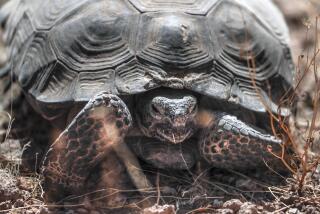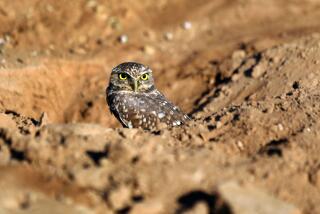Arroyo Toad Declared Endangered : Wildlife: Move affects recreational use at some campgrounds and creeks. Gold miners consider a suit.
The arroyo toad has received status as an endangered species, a move that will make permanent restrictions on the use of some campgrounds and creeks in Ventura Countyâs backcountry, federal biologists announced Thursday.
The listing, which takes effect Jan. 17, puts portions of Piru Creek off-limits to motorcycle riders, gold miners and other recreational users during the breeding season, federal biologists said.
It also closes portions of Lyon and Beaver campgrounds to motor vehicles, requiring campers to haul their gear to those sites by foot. And Snowy Trail, a popular motorcycle path near Hungry Valley State Vehicular Recreation Area, remains closed as biologists and rangers try to reach agreement on where a crossing over sensitive Piru Creek should be moved.
Protection for the toad (Bufo microscaphus californicus) is necessary because degradation of its habitat has reduced the once-thriving species to perilously low numbers, said Sam Sweet, a UC Santa Barbara biologist.
Once widely distributed in coastal Southern California rivers, the arroyo toad has vanished from about 75% of its former range, said Sweet, an international expert on the species.
In 1992, there were as few as 350 adult toads in the Los Padres National Forest, Sweet said. That number has rebounded to about 2,000 today, but the species remains fragile, he said.
âThe arroyo toad is simply one of many animals that are disappearing,â Sweet said. âOther species that live near it are also in danger of disappearing. If we value stream corridors and riparian areas, this is what we have to do.â
But recreational-use advocates said Thursday that they are disappointed by the decision, published Dec. 16 in the Federal Register by U.S. Fish and Wildlife Service biologists.
Federal officials did not properly evaluate the economic impact of the listing in their environmental analysis, said Barret Wetherby, president of Public Lands for the People.
The listing also does not take into account the historic rights of gold miners to prospect on streams in which they have a stake, Wetherby said.
âToo many agencies in the state and federal government seem to enjoy closing down land to the public,â said Wetherby, whose Azusa-based group represents 600 recreational gold miners, off-road vehicle enthusiasts, hikers and campers.
âBut we wonât give it up without a fight,â he said.
His group is considering a lawsuit that would fight the designation based on the environmental study and its apparent clash with a 122-year-old federal mining law, Wetherby said.
The 1872 Mining Law allows prospectors to make a gold claim on public lands if the claim is filed with the Bureau of Land Management. Miners have hundreds of such claims along Piru Creek alone, Wetherby said.
He said federal biologists also underestimated the natural processes that have threatened the toad, including droughts, animal predators and small population sizes.
Much of the arroyo toad population today is found in the Los Padres Forest in the backcountry of Santa Barbara and Ventura counties, biologists say. But smaller, isolated populations are also found in Los Angeles, Orange, San Bernardino, Riverside and San Diego counties.
Most campers will not notice anything different after the listing takes effect because much of the precautionary measures set up to protect the toad have already been instituted, officials said.
Snowy Trail has been closed since 1990 because it crosses Piru Creek near an arroyo toad breeding area. Forest officials are close to an agreement that would allow the trail to reopen if the crossing is moved away from the sensitive habitat, said Cat Brown, a biologist in the Ventura office of the Fish and Wildlife Service.
The restrictions at Lyon and Beaver campgrounds have also been effect for several years, Brown said. Adult arroyo toads are nocturnal and forage for food late at night, she said.
Campers in the past have arrived in cars at night and flattened the toads, Brown said. The camp sites that are off-limits to vehicles have helped alleviate that problem, she said.
Forest rangers have also posted signs at all campgrounds warning about the toadâs sensitive breeding grounds, she said.
Brown disputed Wetherbyâs assertion that human rights are being trampled by the endangered species listing.
âItâs not our goal to close down the forest or the creeks,â she said. âItâs our goal to find a balance.â
More to Read
Sign up for Essential California
The most important California stories and recommendations in your inbox every morning.
You may occasionally receive promotional content from the Los Angeles Times.










